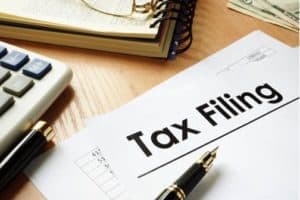Australia is a major destination for expats for various reasons including lifestyle, love, careers and, let’s not forget, the beaches. This guide to expat tax in Australia provides a general review of the tax environment of Australia.
Australian Tax Guide
The Australian tax year runs from July 1st to June 30th. Australian tax returns are due by October 31 following the end of the tax year, unless you are registered with an Australian Tax Agent whereby the due date is extended to May the following year. The Australian equivalent of the IRS/CRA/HMRC is called the ATO (the Australian Taxation Office).

Who Is Liable for Income Taxes In Australia?
In Australia, there are several distinct tax residency categories. Ensuring you declare your income per the correct category rules is vital, you may pay thousands in extra tax if you get it wrong. The tax resident categories are:
• Australian resident for tax purposes
• Foreign Resident/non-resident for tax purposes
• Temporary Resident
• Working holidaymakers (WHM)
An Australian resident for tax purposes
As an Australian resident for tax purposes, you must declare all income (and deductions) you earned both in Australia and internationally on your Australian tax return (even if you’ve already paid tax on it overseas). For example, USA share sales.
You will be considered a resident for tax purposes in Australia if you:
• reside in Australia;
• are domiciled in Australia (i.e. your permanent place of abode is Australia);
• spend at least 183 days in Australia in a year;
To confirm your Australian tax residency, you could use the Residency Research Tool {worldwideaccountancy.com.au/residency-quiz} by our partner firm, Worldwide Accountancy.

Foreign Resident/non-resident for tax purposes
As a foreign resident, you only pay tax on your Australian sourced income (Australian employment income, Australian interest income, and Australian share dividends). Any income earned abroad does not need to be included in your Australian tax return.
If you do not meet any of the above criteria for being a resident for tax purposes, you are most likely a foreign resident.
Temporary Resident
If you have a temporary visa you may be considered a temporary resident for tax purposes. This means you only declare income you derived in Australia, plus any income you earn from employment or services performed overseas while you are a temporary resident of Australia. Other foreign income and capital gains do not have to be declared.
Working Holidaymakers
A recent addition to the categories. If you come to Australia on a Work and Holiday visa (subclass 462) or a Working Holiday visa (subclass 417) you will have a fixed tax rate regardless of your tax residency status. Nationals of the following countries (Chile, Finland, Japan, Norway, Turkey, the United Kingdom, Germany or Israel) may avoid these tax rates per a recent case (Addy v FCT [2021] HCA 34) which noted it was “discriminatory under the non-discrimination Article 25 in the UK and Aus Double Tax Agreement (DTA)” to apply such taxes.
Tax Rates for Australia
Tax rates for 2021-22 for residents are:
| Resident tax rates 2021–22 | |
| Taxable income | Tax on this income |
| 0 – $18,200 | Nil |
| $18,201 – $45,000 | 19 cents for each $1 over $18,200 |
| $45,001 – $120,000 | $5,092 plus 32.5 cents for each $1 over $45,000 |
| $120,001 – $180,000 | $29,467 plus 37 cents for each $1 over $120,000 |
| $180,001 and over | $51,667 plus 45 cents for each $1 over $180,000 |
There is additionally a Medicare tax of 2%. There is also a Medicare surcharge for people, who don’t have acceptable health insurance and earn over a certain amount ($90k for individuals or $180 for families).
| Foreign resident tax rates 2021–22 | |
| Taxable income | Tax on this income |
| 0 – $120,000 | 32.5 cents for each $1 |
| $120,001 – $180,000 | $39,000 plus 37 cents for each $1 over $120,000 |
| $180,001 and over | $61,200 plus 45 cents for each $1 over $180,000 |
| Working holidaymaker tax rates 2021–22 | |
| Taxable income | Tax on this income |
| 0 – $45,000 | 15% |
| $45,001 – $120,000 | $6,750 plus 32.5 cents for each $1 over $45,000 |
| $120,001 – $180,000 | $31,125 plus 37 cents for each $1 over $120,000 |
| $180,001 and over | $53,325 plus 45 cents for each $1 over $180,000 |
Australian Superannuation
Superannuation (super) is a retirement scheme, mandatory for all employers to contribute towards their employee’s retirement. Super is contributed to your nominated fund each pay cycle. As a tax resident in Australia, you are not able to access your super until you have reached the preservation age in Australia – which is currently 60 years old. If you were a temporary resident or WHM, you can withdraw your super but it is levied with a Departing Australia Super Payment tax.
Goods and Services Tax (GST) in Australia
The GST (Goods & Services Tax) is a form of value-added tax applicable to almost all transactions that involve goods & services, other than certain items that are GST-Free. The GST is flat at 10%. It is almost always included in the price of the good or service you will purchase – so you won’t get a nasty surprise at the checkout.
Information provided by Worldwide Accountancy. Please visit their website for more information, worldwideaccountancy.com.au.
Notice: This article was written by Mark Mansour of Worldwide Accountancy – an expert in expatriate taxation for foreigners living in Australia and of course Australian expatriates. The owner of ExpatInfoDesk was not paid a fee for its publication. We strongly recommend that you talk to an expat tax or legal advisor for expat tax-related issues. The owner of ExpatInfoDesk provides no guarantee on the accurateness of the above information.





